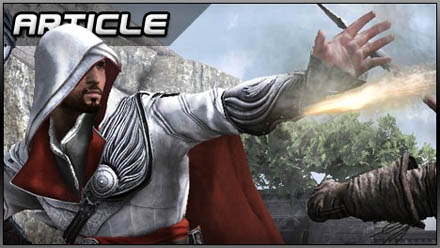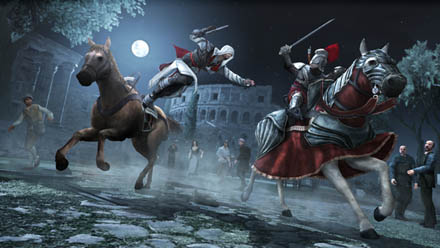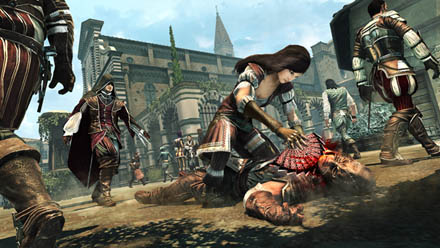
Last week, I finally got around to finishing Assassin’s Creed: Brotherhood. The reason for the rather lengthy period between the game’s release last November and my protracted final stab at making it to the end credits, wasn’t due to any waning interest in the continuing adventure of Ezio Auditore. Instead, it was entirely the result of the fact that I was constantly getting side-tracked buying up every single one of the businesses and landmarks Ubisoft had dotted all over Rome.
Right from the start, the chance for some Renaissance racketeering held a monopoly over my time with the game. Thanks to my efforts, after many solid hours of play, the Assassins were really no closer to defeating the Templars or the Borgia, but they had amassed a commercial property portfolio large enough to float on the stock exchange. I’d purchased the Coliseum with an eye to demolishing it and replacing it with the Maximus Decimus Meridius shopping centre, and, if there was such a thing, I would surely have unlocked the Silvio Berlusconi achievement for the growth I’d single-handedly stimulated in the local prostitution industry. By the end, I honestly expected ‘The Truth’ this time to be a personal message from Sir Alan Sugar.
Brotherhood is, without question, one of the most impressive sandbox titles made to date, and proof positive that great open world game design is a lot like great interior design. It’s not so much about the amount of space you have, as how cleverly you fill it. That’s what makes the difference between creating a place you can live in, and a place you can exist in. A world that envelops you, and one that merely accommodates you. The former feels like home, the latter like you’re staying in someone else’s home. No matter how kind and welcoming they are, it still feels uncomfortable.
When you think back to the original Assassin’s Creed, and the way awkwardly integrated gameplay elements occasionally broke the immersion of the world, (remember those collect-all-the-flags-within-the-time-limit missions) it’s to Ubisoft’s great credit that even Brotherhood’s ancillary activities, like the wealth accumulation ones, now add a wonderful depth and richness to your surroundings.
The thing is though, I signed up to be a fleet-footed, silent killing machine, not a parkouring Theo Paphitis, and what struck me about Brotherhood, was that Ezio may be getting dangerously close to becoming more entrepreneur than assassin. Was I more invested in Brotherhood’s world because of the presence of all the additional content? Yes (quite literally). Was I more involved in, what should be, the most important part of the game, the main storyline? No, because I was constantly being drawn away from this by the fact that I was closer to a bank, blacksmith’s or some other going concern than the next mission marker.
Ubisoft announced recently that the next Assassin’s Creed game, subtitled Revelations, is due this November. If the success of the series now means that the company is going to reward fans by pushing out a game every year until everyone loses interest, let’s hope they don’t continue this upward trend for cheap and easy filler content (no matter how cleverly contextualised or addictively immediate) over actual innovation and development of their fantastic central premise. It would be a huge shame if player fatigue overtook the assassin’s before they’ve had time to run their course, and I swear, if Desmond ends in the modern day running a chain of successful health clubs I’ll assassinate him myself.
Now, if you’ll excuse me, I have a Chamber of Commerce meeting to chair.







 Satoru Iwata Video Interview - the late Nintendo president spoke with Kikizo in 2004 as 'Nintendo Revolution' loomed.
Satoru Iwata Video Interview - the late Nintendo president spoke with Kikizo in 2004 as 'Nintendo Revolution' loomed. Kaz Hirai Video Interview - the first of Kikizo's interviews with the man who went on to become global head of Sony.
Kaz Hirai Video Interview - the first of Kikizo's interviews with the man who went on to become global head of Sony. Ed Fries Video Interview - one of Xbox's founders discusses an epic journey from Excel to Xbox.
Ed Fries Video Interview - one of Xbox's founders discusses an epic journey from Excel to Xbox. Yu Suzuki, the Kikizo Interview - we spend time with one of gaming's most revered creators.
Yu Suzuki, the Kikizo Interview - we spend time with one of gaming's most revered creators. Tetris - The Making of an Icon: Alexey Pajitnov and Henk Rogers reveal the fascinating story behind Tetris
Tetris - The Making of an Icon: Alexey Pajitnov and Henk Rogers reveal the fascinating story behind Tetris Rare founders, Chris and Tim Stamper - their only interview? Genuinely 'rare' sit down with founders of the legendary studio.
Rare founders, Chris and Tim Stamper - their only interview? Genuinely 'rare' sit down with founders of the legendary studio. The History of First-Person Shooters - a retrospective, from Maze War to Modern Warfare
The History of First-Person Shooters - a retrospective, from Maze War to Modern Warfare